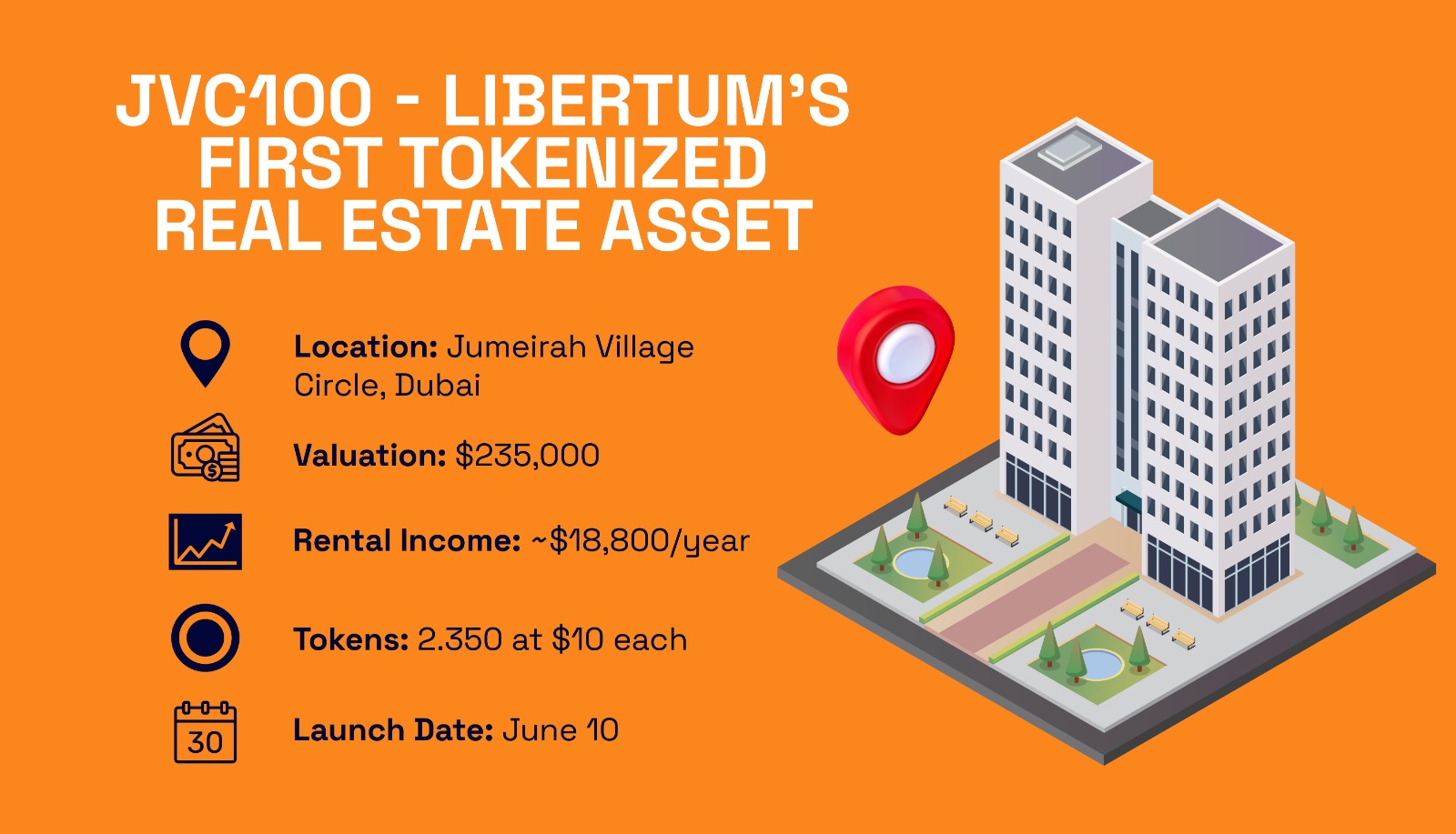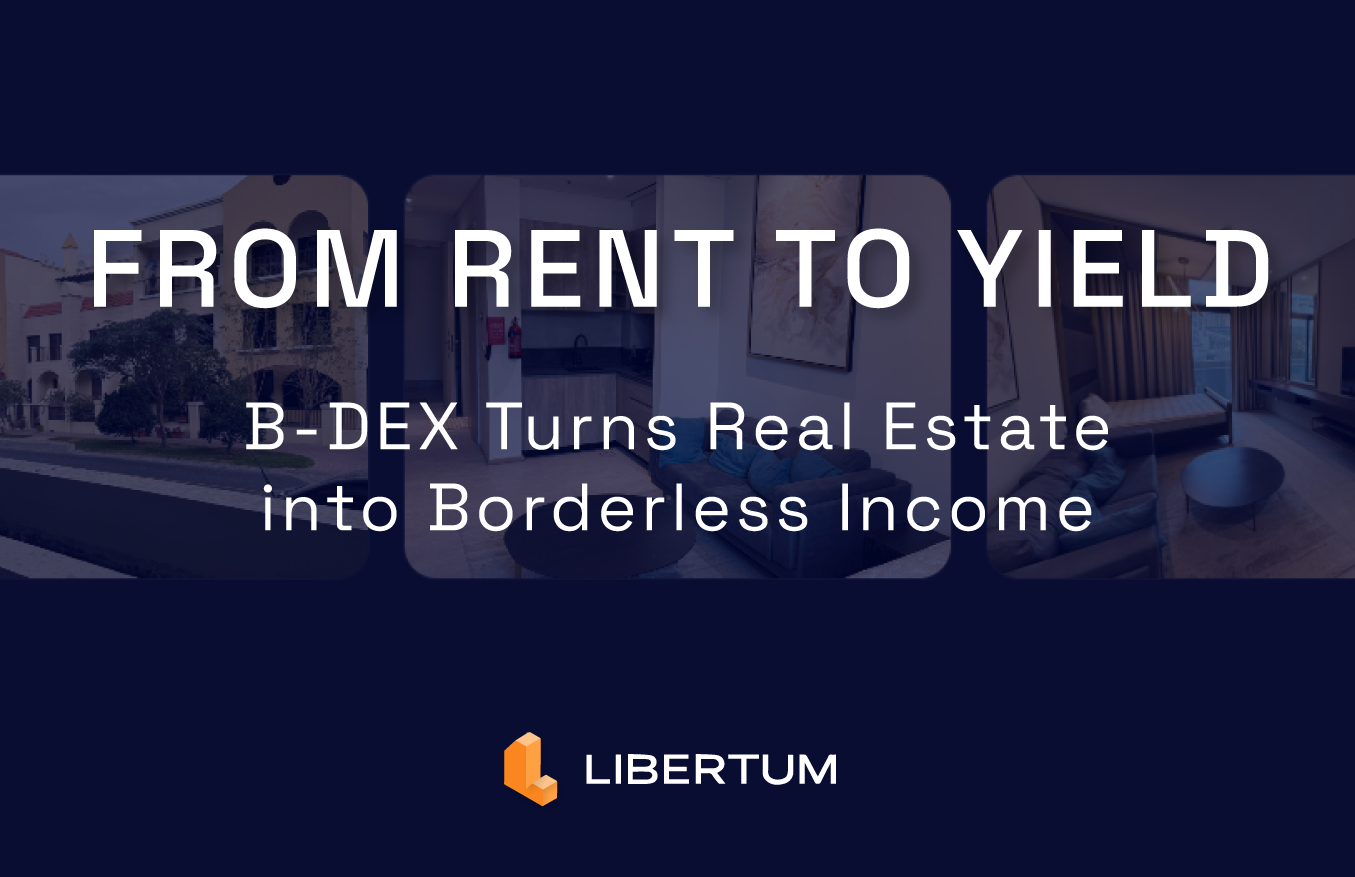In the traditional world of real estate, collecting rent and earning returns is a slow, admin-heavy, and exclusive process. You need capital, local market access, legal infrastructure, and patience, but in the Libertum ecosystem, the game changes. Rent becomes an on-chain yield source, available to anyone globally via B-DEX.
Libertum’s Bonding DEX transforms the flow of rental income into programmable, tradable, and stakable digital value. Real-world rental income is captured, converted into stablecoins, and distributed through blockchain mechanisms, offering transparency, liquidity, and financial inclusion in one ecosystem.
In this blog, we will be exploring how Libertum’s B-DEX turns real estate cash flow into crypto yield and why this model is gaining real traction globally.
Real Estate Cash Flow Meets DeFi Innovation
Let’s start with the basics: how does Libertum actually convert rent into crypto rewards?
At the heart of the process is property tokenization. Libertum onboards real-world real estate (like apartments, commercial units, or housing projects) onto the blockchain. These assets are fractionalized into on-chain tokens using the ERC-20 standard, making them easy to buy, sell, and stake. Token holders gain access to a share of the rental income.
But tokenization alone isn’t the innovation; what Libertum does next is where it gets powerful:
AI-Powered Asset Management
Each property is assigned an on-chain AI Managing Agent. This smart contract automates rent collection, compliance enforcement, and yield tracking, eliminating the need for landlords, agents, or property managers. It ensures that all income is properly collected and routed to token holders.
Bonding Curve Token Sales
Instead of dynamic token pricing via bonding curves, Libertum uses fixed pricing for property tokens. Each token is priced at a fixed rate, ensuring predictable and stable token sales. This eliminates the complexity of fluctuating token prices, offering a straightforward and transparent pricing model for buyers and sellers alike.
Stablecoin Conversion & Distribution
Rent collected from tenants is converted into stablecoins (like USDC). This ensures predictable, dollar-based returns and protects against crypto market volatility.
Staking for Yield
Token holders can stake their tokens on B-DEX to earn a share of the rental income. This yield is distributed regularly in USDC, providing stakers with a passive income stream from real-world rent without owning the physical property.
Buybacks and Burns
If any rental income isn’t claimed by stakers, it’s automatically used to buy back and burn tokens from circulation. This deflationary mechanism reduces the token supply and increases the value for remaining holders.
Staking, Bonding, and Stablecoin Distribution Explained
Now let’s break this into parts, so you understand exactly what’s happening under the hood:
Bonding
- Bonding is how new tokens are purchased. Users send USDC into the B-DEX smart contract and receive tokens at a fixed price.
- As the project grows, fixed pricing ensures consistency in token valuation for both investors and stakers. This simplified model removes the need for market fluctuations, offering predictable costs for buyers.
- Once the bonded token is listed on a decentralized exchange, its price is determined by the demand and supply dynamics of the market.
Staking
- Once a user has tokens, they can stake them on the B-DEX platform.
- The rental income (in stablecoin) collected by the AI Managing Agent is distributed proportionally to all staked tokens.
- There are no lock-in periods. Users can unstake at any time and either continue holding or sell their tokens.
Yield Distribution
- Rent is converted to USDC, which means returns are not in volatile tokens but in stablecoins. These stablecoins are predictable, accessible, and globally spendable.
- Distribution occurs automatically through the smart contract and is fully transparent.
Use Cases: Who Can Participate?
The beauty of B-DEX is that it opens up property-based yield to a wide range of global users and is not limited to real estate insiders.
Property Owners & Developers
Landlords can tokenize their properties to raise funds and generate ongoing yield. Instead of relying on banks or private buyers, they can:
- Bond property tokens through B-DEX
- Raise liquidity instantly
- Automate all tenant-related processes via AI agents
Retail Investors
Anyone, anywhere can now gain exposure to property-backed income:
- Compliant, on-chain asset structure (ERC-3643 optional)
- Real-time APY tracking via AI-managed dashboards
- Diverse yield sources, from urban apartments to commercial units
Fund Managers & Investment DAOs
For institutions, Libertum offers programmable exposure to high-yield real estate:
- Compliant, on-chain asset structure (ERC-3643 optional)
- Real-time APY tracking via AI-managed dashboards
- Diverse yield sources, from urban apartments to commercial units
Success in Action: JVC100 – First Real Estate Tokenization

To demonstrate the power of real-world asset tokenization, we take a look at JVC100, Libertum’s first tokenized real estate asset. This project illustrates how B-DEX seamlessly transforms traditional property investment into a liquid, decentralized, and income-generating asset. Let’s explore it.
Location: Jumeirah Village Circle, Dubai
Valuation: $235,000
Rental Income: ~$18,800/year
Tokens: 2,350 at $10 each
Launch Date: June 10
Within 2 weeks, the entire property was sold. Buyers from 4 continents participated, and staking yield reaches ~8% APY in USDC. The entire process—bonding, staking, and income—is managed on-chain via Libertum’s AI agent.
Why B-DEX Is a Game-Changer
- AI-managed operations: Fully automates rent collection and distribution.
- Fixed pricing: Predictable token value with instant liquidity.
- Stablecoin yield: Returns in USDC, avoiding crypto volatility.
- Open to all: Anyone can invest from $100 globally.
- Proven traction: JVC100 demonstrates active, global interest.
What’s Next?
Following JVC100’s success, future listings will include:
- Residential units across regions
- Commercial buildings
- Farmland and productive land
- Debt-based property assets
- Off-plan properties
Libertum has formed a strategic partnership with Samana Developers, a key innovator in real estate. Together, they are tokenizing over 45 active developments worth $2 billion, opening 24/7 global access to exclusive real estate deals for our investor community.
Final Thoughts
Libertum’s B-DEX is not just an upgrade to real estate investing; it is a complete reinvention. By combining on-chain liquidity, AI-powered property management, and stablecoin-based rental yield, Libertum transforms rental income into a decentralized and democratized financial product. There are no banks, no borders, and no paperwork.
For the first time, anyone, from a student with $100 to an investment DAO managing millions, can access institutional-grade real estate income with instant liquidity and full transparency.
This is more than a bridge between real estate and DeFi. It is a new asset class: programmable, permissionless property income.
